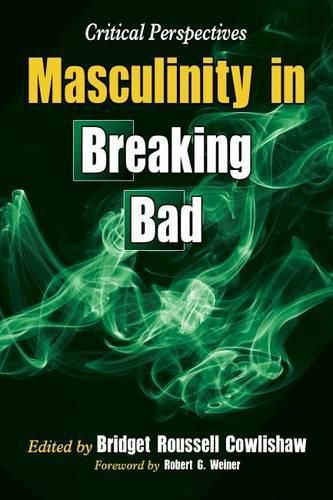Readings Newsletter
Become a Readings Member to make your shopping experience even easier.
Sign in or sign up for free!
You’re not far away from qualifying for FREE standard shipping within Australia
You’ve qualified for FREE standard shipping within Australia
The cart is loading…






This title is printed to order. This book may have been self-published. If so, we cannot guarantee the quality of the content. In the main most books will have gone through the editing process however some may not. We therefore suggest that you be aware of this before ordering this book. If in doubt check either the author or publisher’s details as we are unable to accept any returns unless they are faulty. Please contact us if you have any questions.
These essays consider the award-winning television series Breaking Bad as a critique of early-twentieth-century American concepts of masculinity. Susan Johnston analyses fatherhood in Breaking Bad. The man who protects this family becomes an ironic as Walter’s rationale for crime is gradually revealed as a lie.
Ian Dawe reads Breaking Bad as a traditional Western where a man stakes a claim, shoots it out with rivals, and chooses to be the outlaw or the family man. Brian Cowlishaw examines considers how uncomfortably our culture combines masculinity with intellect. R. Nicholas Gerlich and Lori Smith Westermann explore the series’ capitalist concept of manhood in which to provide is what a man does.
Stephanie Gross examines the strategies of the capitalist battleground, employing Machiavelli as Walter White’s uncredited mentor. In a chapter related to both Walter White as both family man and businessman, Ian Dawe examines the series’ preoccupation with its men’s longing to leave a legacy. Jeffrey Reid Pettis considers Breaking Bad’s quirky camera angles and characters’ surveillance of each other–who is watching whom decides which man wins. In round table chapters, contributors discuss the show’s reception: fans who root for Team Walt,
Skyler-hating, and Breaking Bad as a feminist text.
$9.00 standard shipping within Australia
FREE standard shipping within Australia for orders over $100.00
Express & International shipping calculated at checkout
This title is printed to order. This book may have been self-published. If so, we cannot guarantee the quality of the content. In the main most books will have gone through the editing process however some may not. We therefore suggest that you be aware of this before ordering this book. If in doubt check either the author or publisher’s details as we are unable to accept any returns unless they are faulty. Please contact us if you have any questions.
These essays consider the award-winning television series Breaking Bad as a critique of early-twentieth-century American concepts of masculinity. Susan Johnston analyses fatherhood in Breaking Bad. The man who protects this family becomes an ironic as Walter’s rationale for crime is gradually revealed as a lie.
Ian Dawe reads Breaking Bad as a traditional Western where a man stakes a claim, shoots it out with rivals, and chooses to be the outlaw or the family man. Brian Cowlishaw examines considers how uncomfortably our culture combines masculinity with intellect. R. Nicholas Gerlich and Lori Smith Westermann explore the series’ capitalist concept of manhood in which to provide is what a man does.
Stephanie Gross examines the strategies of the capitalist battleground, employing Machiavelli as Walter White’s uncredited mentor. In a chapter related to both Walter White as both family man and businessman, Ian Dawe examines the series’ preoccupation with its men’s longing to leave a legacy. Jeffrey Reid Pettis considers Breaking Bad’s quirky camera angles and characters’ surveillance of each other–who is watching whom decides which man wins. In round table chapters, contributors discuss the show’s reception: fans who root for Team Walt,
Skyler-hating, and Breaking Bad as a feminist text.